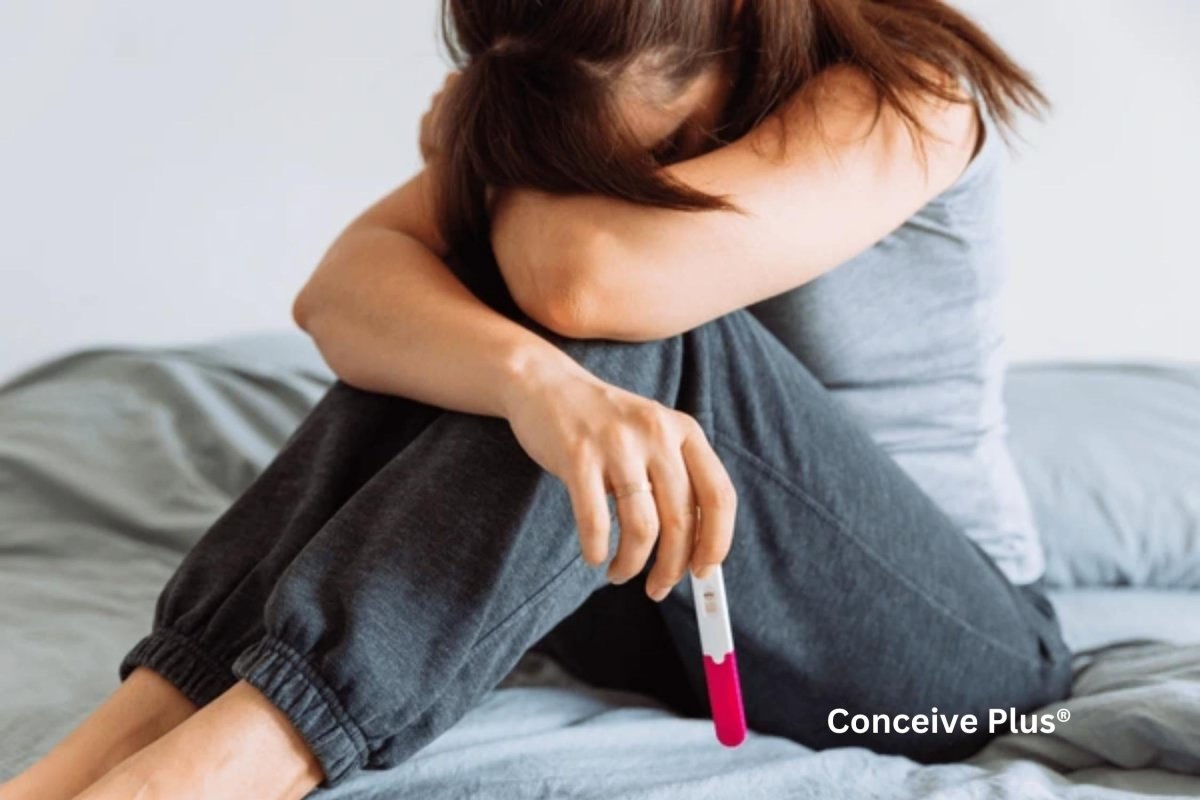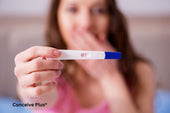I Want a Baby: Why Can’t I Conceive?

Having a baby is a dream for many couples, but sometimes getting pregnant can be difficult. There are many reasons why pregnancy might not happen right away. In some cases, you can easily fix the issues stopping you from getting pregnant, while in other cases, you need to go for infertility treatment options to fulfill the dream of having a baby.
In this article, we will explore some possible factors that might be stopping you from conceiving and how you can improve your fertility and chances of conception. In addition, the article answers a common question asked by many infertile women: "I want a baby, but I cannot conceive naturally. What can help?
Reasons You May Not Be Getting Pregnant
It is important to understand that many factors can affect your ability to get pregnant. These factors can be related to your lifestyle habits, health conditions, or even age. Here are some common reasons why you might not be having a baby even after repeated attempts:
-
Lifestyle Factors
Different lifestyle factors that influence your fertility and chances of conception include your diet, weight, and substance abuse. Here is a detail on all these factors:
- Diet and Nutrition: Eating a poor or nutrient-deficient diet can harm your fertility and reduce your chances of getting pregnant. You might ask, "How does that happen?" Well, your reproductive system requires many different essential vitamins and minerals to function properly and support a healthy pregnancy [1].
If your diet lacks those nutrients, your body may not be ready to support a pregnancy. In addition to causing nutritional deficiencies, processed foods, and sugary drinks can directly harm your fertility health [1].
- Weight Issues: Being overweight or obese is negatively associated with female fertility health. Obesity can lead to hormonal fluctuations that can disrupt the menstrual cycle regularities. Studies show that the risk of infertility is three times higher in obese women compared to non-obese women [2].
Being underweight can also lead to hormonal imbalances and irregular menstrual cycles, which may reduce fertility and lower the chances of conception.
- Smoking and Alcohol: Studies show that smoking can damage the quality of female egg cells [3]. It can also disrupt the natural hormone balance that your body needs for regular ovulation.
Alcohol consumption can interfere with the hormonal signals that regulate the menstrual cycle. Heavy drinking may lead to irregular periods which increases the risk of anovulation — a lack of ovulation.
-
Medical Conditions
Different health conditions can negatively impact female fertility health and her ability to conceive. Here are some of those health conditions:
- Polycystic Ovary Syndrome (PCOS): PCOS is a health condition that affects many women in their reproductive age. It causes irregular periods and can disrupt the release of eggs. Because of this, many women with PCOS struggle to get pregnant [4]. The condition can also lead to hormonal imbalances that further reduce fertility.
- Endometriosis: Endometriosis is a condition where tissue like the lining of the uterus grows outside the uterus [5]. This extra tissue can cause pain and heavy bleeding during periods. It can also block the tubes that carry eggs, which makes it harder for a woman to get pregnant.
- Thyroid Problems: Thyroid problems, such as an overactive or underactive thyroid, can change hormone levels. These changes may lead to irregular menstrual cycles, which can make it harder to get pregnant [6].
-
Age and Fertility
Fertility naturally declines as you get older. It is more prevalent in women as they have a certain number of eggs in the ovaries which decrease over time.
On average, a woman reaches the end of her reproductive age, also known as menopause, between the age of 45 and 55 years [7]. The age of your male partner can also be the reason for struggling to conceive, as sperm quality can also decrease with age.
-
Timing
Even if your fertility health is optimal, you may struggle to conceive if you are not aware of your fertility window. A woman is only able to conceive for a short duration during her menstrual cycle, which is called the fertility window.
The duration of the fertility window is usually 5 to 6 days, which includes a few days before ovulation and the day of ovulation. If you are not having unprotected sex during this window, you may struggle to conceive.
How to Increase Your Chances of Getting Pregnant?
You can increase your chances of conception by improving your fertility health. The following are the simple and easy-to-follow steps to prepare your body for a healthy pregnancy:
-
Adopt a Healthy Diet
To meet the nutritional demands of your body for optimum fertility health, fill your plate with fruits, vegetables, whole grains, lean proteins, and healthy fats.
Such foods give your body the essential vitamins and minerals that support fertility health. For example, leafy greens are high in folate, which is essential for a healthy pregnancy. Also, drinking enough water each day helps your body function well. You should aim for at least 8 glasses of water daily.
-
Stay Physically Active
Physical activity can help you maintain a healthy weight. Try to include both cardio and strength training exercises in your routine. Walking, swimming, or cycling are good choices to stay active and support healthy reproductive functioning.
However, it is important to remember that too much exercise can also harm fertility. Talk to a doctor or a fitness expert if you are unsure how much and what types of exercises are right for you.
-
Track Your Menstrual Cycle
Tracking your menstrual cycle can help you know when you are most likely to get pregnant. Typically, the best time to conceive is around your ovulation days, which is in the middle of your cycle.
You can use different fertility apps or online ovulation calculators to track your cycle and determine your most fertile days. Once you determine your most fertile days, plan regular intercourse for maximum chances of fertilization.
During intercourse, using fertility-friendly lubricants, like Fertility Lubricant by Conceive Plus, can support sperm movement toward the egg and increase your chances of conception.
-
Visit a Healthcare Provider
A doctor can evaluate your overall health and help spot any issues that may affect fertility. They may recommend tests or treatments to improve your chances of conceiving. Be open about your wish to have a baby. Your doctor can provide advice that is tailored to your needs and health conditions.
Fertility Treatments When Natural Conception Is Not Possible
Sometimes, despite making healthy changes, getting pregnant can still be a challenge. In such a situation, you might find yourself asking, "I want to have a baby. What can help me get pregnant? Fortunately, there are treatments available to help when this happens. The common treatment options include:
-
In Vitro Fertilization
In vitro fertilization, or IVF, is a process where eggs and sperm are combined in a lab [8]. After the eggs are fertilized, the doctor carefully places a healthy embryo into the womb, where it grows and develops into a mature baby.
IVF is often used when there are issues with the fallopian tubes or when other treatment options aren't effective. It can also help in cases where there are issues with the quality of eggs or sperm.
-
Intrauterine Insemination
In intrauterine insemination, or IUI, washed sperm is placed directly into the womb. This process gives the sperm a better chance of reaching the egg. IUI is used when there are mild issues with fertility. It is less invasive than IVF and doctors try it before moving on to more advanced treatments.
-
Medications to Boost Fertility
Different hormonal medications help to balance hormones and stimulate the production of eggs. These treatments are often the first step for women who do not ovulate regularly.
In addition to hormonal medications, different fertility supplements can also support menstrual regularity and improve overall reproductive functioning. One excellent example is Ovulation Support by Conceive Plus, which promotes regular ovulation and overall menstrual health.
-
Surgery
Sometimes, surgery can help if there are physical issues responsible for infertility. For example, surgery can repair blocked fallopian tubes or remove growths like fibroids that might affect the chances of pregnancy.
Laparoscopic surgery is also an option where a doctor uses a camera to see inside the abdomen and operate. It is less invasive and helps the doctor fix small problems.
Choosing the Right Treatment
Every situation is unique, and it is important to talk with a fertility specialist to understand your condition. They can guide you on which treatment is best for your situation.
Some treatments can be expensive and may have risks. Make sure you understand the benefits and potential challenges of each treatment. Since fertility treatments can be stressful, it is important to seek support from family, friends, or counseling services during this time.
Conclusion
Women often visit fertility clinics with a concern: I want a baby or I want to have a baby, but I'm struggling to conceive. If you’re thinking, 'I want to get pregnant so bad,' but are struggling, understanding the underlying reasons and exploring solutions can help you take the right steps toward achieving your goal. It is important to understand that many factors can affect your ability to conceive, including lifestyle choices, medical conditions, and age.
By adopting a healthy diet, maintaining a healthy weight, and tracking your cycle, you can improve your fertility health and chances of getting pregnant. When natural conception is difficult or not possible, there are many treatments available. Treatments like IVF, IUI, fertility medications, and surgery can help you fulfill your dream of having a baby.
Remember, you are not alone in this journey. Many people face challenges when trying to conceive. Seek help from a healthcare provider or a fertility specialist to clear your doubts and get expert advice.
Resources Used
- Skoracka, K., Ratajczak, A. E., Rychter, A. M., Dobrowolska, A., & Krela-Kaźmierczak, I. (2021). Female Fertility and the Nutritional Approach: The Most Essential Aspects. Advances in Nutrition, 12(6), 2372. https://doi.org/10.1093/advances/nmab068
- Silvestris, E., Rosania, R., & Loverro, G. (2018). Obesity as disruptor of the female fertility. Reproductive Biology and Endocrinology : RB&E, 16, 22. https://doi.org/10.1186/s12958-018-0336-z
- Dhage, V. D., Nagtode, N., Kumar, D., & Bhagat, A. K. (2024). A Narrative Review on the Impact of Smoking on Female Fertility. Cureus, 16(4), e58389. https://doi.org/10.7759/cureus.58389
- Melo, A. S., Ferriani, R. A., & Navarro, P. A. (2015). Treatment of infertility in women with polycystic ovary syndrome: Approach to clinical practice. Clinics, 70(11), 765. https://doi.org/10.6061/clinics/2015(11)09
- Parasar, P., Ozcan, P., & Terry, K. L. (2017). Endometriosis: Epidemiology, Diagnosis and Clinical Management. Current Obstetrics and Gynecology Reports, 6(1), 34. https://doi.org/10.1007/s13669-017-0187-1
- Mazzilli, R., Medenica, S., Di Tommaso, A. M., Fabozzi, G., Zamponi, V., Cimadomo, D., Rienzi, L., Ubaldi, F. M., Watanabe, M., Faggiano, A., Vignera, S. L., & Defeudis, G. (2022). The role of thyroid function in female and male infertility: A narrative review. Journal of Endocrinological Investigation, 46(1), 15. https://doi.org/10.1007/s40618-022-01883-7
- World Health Organization: WHO. (2024, October 16). Menopause. https://www.who.int/news-room/fact-sheets/detail/menopause
- In vitro fertilization (IVF): MedlinePlus Medical Encyclopedia. (n.d.). https://medlineplus.gov/ency/article/007279.htm



















